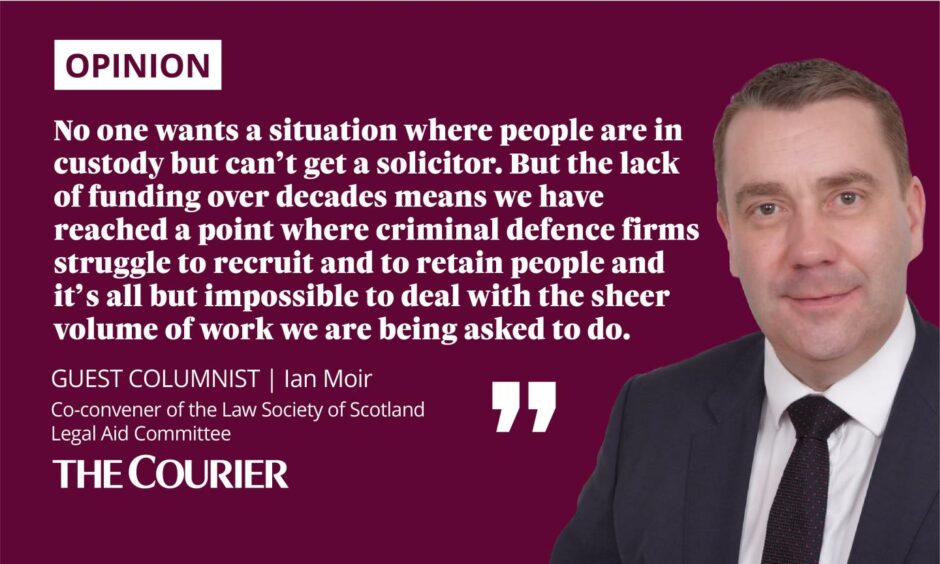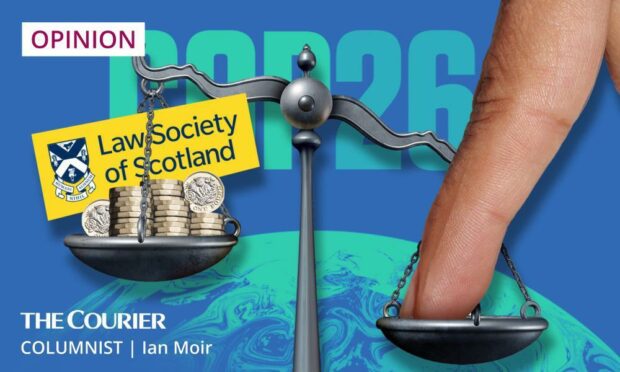Local faculties and bar associations, representing lawyers across Scotland have announced they will not sign up to the additional custody courts to be held over three weekends during COP26.
It is sadly, highly predictable.
As the Law Society’s Criminal Legal Aid convener, alongside many of my peers and colleagues in the criminal defence bar, I have been pressing for change and proper funding for legal aid.
This is not just in relation to the additional custody courts planned for the duration of the COP26 climate change summit.
It is to ensure that the legal aid system and our courts function properly now and for the long term.

The criminal defence bar in Scotland plays a central role in a modern system of criminal justice, which is fair and transparent.
It is a system which acknowledges the presumption of innocence, the rule of law and the need for due process.
The challenges around ensuring capacity for this landmark event have raised wider issues around the funding and sustainability of the legal aid sector and the growing imbalance in funding across the criminal justice system.
It relies equally on the judiciary, the prosecution and the defence.
If any one of these is out of balance, the whole is put at jeopardy.
No one wants a situation where people are in custody but can’t get a solicitor.
But the lack of funding over decades means we have reached a point where criminal defence firms struggle to recruit and to retain people and it’s all but impossible to deal with the sheer volume of work we are being asked to do.
— Law Society Scotland (@Lawscot) October 25, 2021
Without significant investment which will allow firms like my own to be able to offer more attractive pay and conditions, it’s a problem that’s not going anywhere.
COP26 will add to court pressures
That COP26 is likely to add to the already acute pressure on the courts and court backlog as a result of the pandemic cannot be ignored.
However no solicitors will have taken the decision to withdraw from the duty custody court scheme lightly.
It is our job to be there to represent clients, but the demands being placed on the criminal defence profession currently are too high and no long term solutions are being offered.
The additional courts planned for COP26 are simply the straw that has finally broken the camel’s back.
So many solicitors have gone above and beyond, again and again, to ensure that those who rely on their expertise were not disadvantaged and that our justice systems continued to function, particularly during the past 18 months.
We pushed hard for support during the Covid-19 pandemic. And we were pleased that the government agreed to create the legal aid resilience and recovery fund to offer a much-needed financial lifeline.
We appreciate that Scottish Government has made the case for additional funding to the UK Government and will put legal aid fee arrangements in place for the COP26 period.
We also welcomed the Scottish Government’s agreement to provide a further £1 million as support for 40 new legal aid trainees this summer.
The fund, managed by the Law Society, will assist firms in nurturing new talent throughout these traineeships.
These initiatives have provided a financial respite for this hard-pressed, yet vital, part of the profession. But they are not enough.
Legal aid problems were present before pandemic
In the decade preceding the pandemic, the number of firms and solicitors providing criminal legal aid reduced by a quarter.
The number of civil legal aid firms fell by a fifth.
We were already concerned about the capacity and resilience of the sector before the pandemic. These concerns are more acute now.
There is ample evidence to support a new legal aid fee framework and for legal aid fees themselves to be increased to sustainable levels.
We believe that this increase should be at least 50%. The Law Society recommended this to government last year as necessary to prevent the situation which is now materialising.
This was rejected and we are, regrettably, seeing the outcomes of that.
It’s why we continue to call for long-term funding solutions to ensure that everyone, regardless of their financial means, has access to justice now and in the future.
Ian Moir is co-convener of the Law Society of Scotland Legal Aid Committee.










